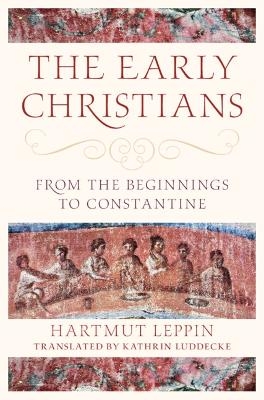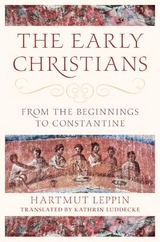The Early Christians
From the Beginnings to Constantine
Seiten
2023
Cambridge University Press (Verlag)
978-1-316-51723-9 (ISBN)
Cambridge University Press (Verlag)
978-1-316-51723-9 (ISBN)
Ancient Christians are closely connected to today's world through a living memory and a common textual heritage - the Bible - even for non-Christians. However, as this engrossing new account shows, much about the early Christians is foreign to us and far removed from what passes for Christianity today.
The early Christians were by no means a homogeneous group, let alone a church. This is the fascinating story of the beliefs, practices and experience of individual Christians of antiquity, their relationships to Jewish tradition and the wider Roman world, and the shockwaves they caused among their contemporaries. Ancient Christians are closely connected to today's world through a living memory and a common textual heritage - the Bible - even for those who maintain a distance from Christianity. Yet, paradoxically, much about the early Christians is foreign to us and far removed from what passes for this faith as it currently stands. The distinguished historian Hartmut Leppin explores this paradox, and considers how such a small, diverse band of followers originating on the edge of the Roman Empire was able within less than three centuries to grow and become its dominant force under Emperor Constantine and his successors.
The early Christians were by no means a homogeneous group, let alone a church. This is the fascinating story of the beliefs, practices and experience of individual Christians of antiquity, their relationships to Jewish tradition and the wider Roman world, and the shockwaves they caused among their contemporaries. Ancient Christians are closely connected to today's world through a living memory and a common textual heritage - the Bible - even for those who maintain a distance from Christianity. Yet, paradoxically, much about the early Christians is foreign to us and far removed from what passes for this faith as it currently stands. The distinguished historian Hartmut Leppin explores this paradox, and considers how such a small, diverse band of followers originating on the edge of the Roman Empire was able within less than three centuries to grow and become its dominant force under Emperor Constantine and his successors.
Hartmut Leppin is a Professor of Ancient History at Goethe University, Frankfurt. His research focuses on early Christianity and he has been awarded Germany's highest science prize, the Gottfried Wilhelm Leibniz Prize, as well as the Erwin Stein Prize for interdisciplinary work that is also relevant to the present. His publications have been translated into six languages.
Introduction; Prologue: a dead body is lost to the world; 1. Neither Jewish nor pagan?; 2. Christian authorities; 3. (Not) of this world: caring for self and others; 4. Citizens of two worlds; Looking back and ahead; Postscript.
| Erscheinungsdatum | 27.10.2023 |
|---|---|
| Reihe/Serie | Classical Scholarship in Translation |
| Übersetzer | Kathrin Luddecke |
| Vorwort | Jan N. Bremmer |
| Zusatzinfo | Worked examples or Exercises; 2 Maps; 11 Halftones, color; 5 Halftones, black and white; 3 Line drawings, black and white |
| Verlagsort | Cambridge |
| Sprache | englisch |
| Maße | 161 x 235 mm |
| Gewicht | 860 g |
| Themenwelt | Geschichte ► Allgemeine Geschichte ► Vor- und Frühgeschichte |
| ISBN-10 | 1-316-51723-3 / 1316517233 |
| ISBN-13 | 978-1-316-51723-9 / 9781316517239 |
| Zustand | Neuware |
| Informationen gemäß Produktsicherheitsverordnung (GPSR) | |
| Haben Sie eine Frage zum Produkt? |
Mehr entdecken
aus dem Bereich
aus dem Bereich
Was Pompeji über uns erzählt
Buch | Hardcover (2023)
Propyläen (Verlag)
CHF 44,75
auf den Spuren der frühen Zivilisationen
Buch | Hardcover (2023)
C.H.Beck (Verlag)
CHF 27,95




